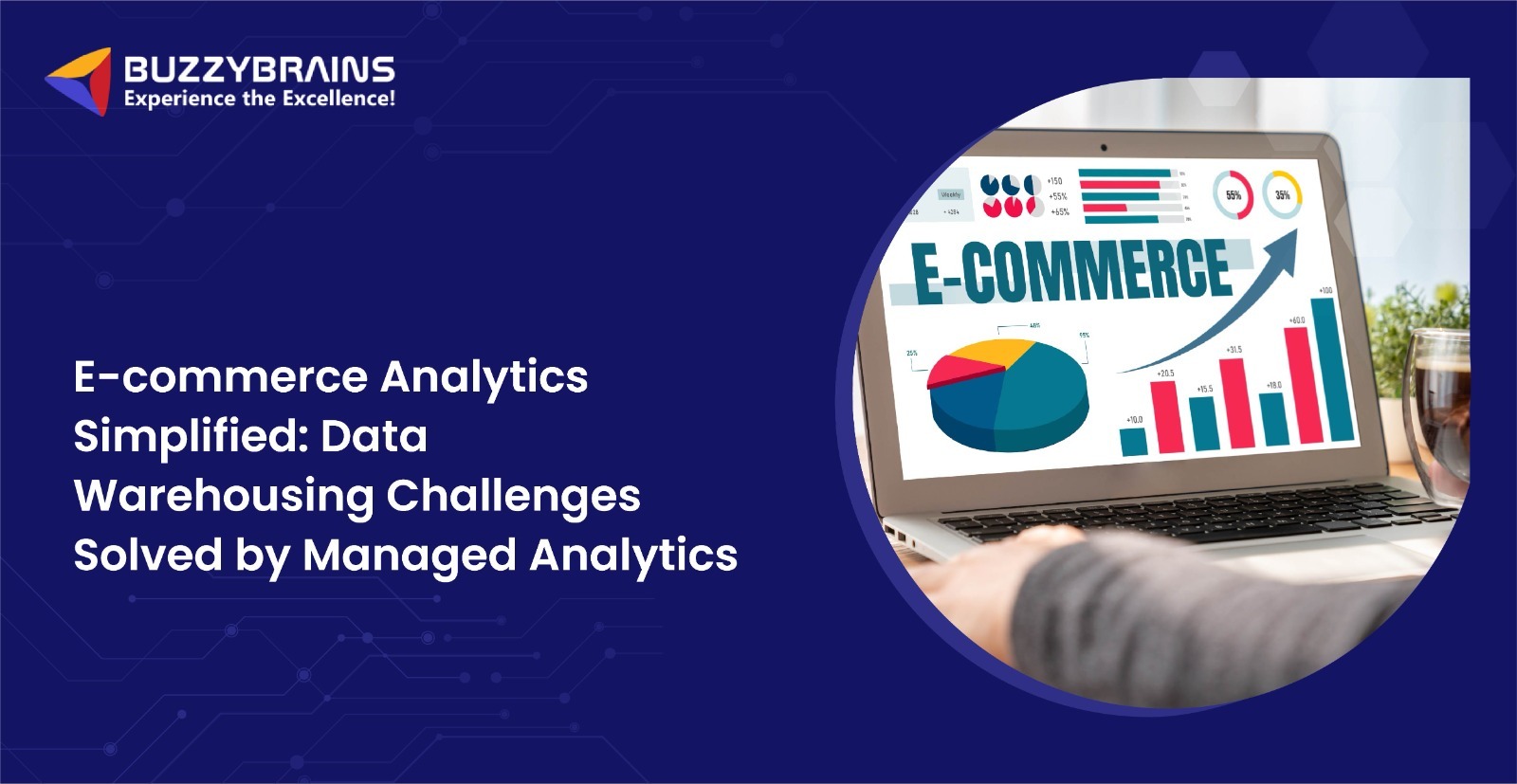E-commerce Analytics Simplified: Data Warehousing Challenges Solved by Managed Analytics

In the fast-paced world of e-commerce, businesses must leverage data to stay competitive and drive growth. Analyzing vast amounts of data from various sources allows companies to understand customer behavior, optimize operations, and make informed decisions. However, managing and making sense of this data can be overwhelming. This is where data warehousing and managed analytics come into play, offering powerful solutions to simplify e-commerce analytics.
- What is Data Warehousing and Why It Is Important for E-commerce Analytics?
- Common Challenges in Data Warehousing for E-commerce
- What is Managed Analytics and How It Can Help?
- Benefits of Managed Analytics for E-commerce Data Warehousing
- Key Features of Managed Analytics Solutions
- Best Practices for Implementing Managed Analytics in E-commerce
- FAQs about Data Warehousing in Financial Forecasting
- Conclusion
- Gain a Competitive Edge with BuzzyBrains Managed Analytics for E-commerce!
What is Data Warehousing and Why It Is Important for E-commerce Analytics?
Data warehousing is the process of collecting, storing, and managing large volumes of data from different sources in a centralized repository. This consolidated data warehouse enables organizations to perform comprehensive analyses and generate actionable insights. For e-commerce businesses, a data warehouse is crucial because it provides a unified view of data from multiple touchpoints, including website interactions, sales transactions, customer support, and marketing campaigns.
E-commerce platforms generate vast amounts of data every second. Properly managing this data allows businesses to uncover trends, measure performance, and predict future outcomes. Without a data warehouse, integrating and analyzing data from disparate sources can be time-consuming and error-prone. A well-structured data warehouse ensures data consistency, quality, and accessibility, empowering e-commerce businesses to make data-driven decisions efficiently.
Related Blog: What is Data Warehousing: A Detailed Introduction to Data Warehousing
Common Challenges in Data Warehousing for E-commerce
Building and maintaining a data warehouse for e-commerce analytics comes with several challenges:
- Data Integration: Aggregating data from various sources, such as websites, mobile apps, and third-party platforms, can be complex and require significant effort.
- Data Quality: Ensuring the accuracy, consistency, and completeness of data is critical, as poor-quality data can lead to incorrect insights and decisions.
- Scalability: As e-commerce businesses grow, the volume of data increases, requiring scalable solutions to handle the expanding data sets without compromising performance.
- Data Security: Protecting sensitive customer information and ensuring compliance with data privacy regulations are paramount.
- Real-time Processing: E-commerce businesses need to process and analyze data in real-time to respond to market changes and customer needs promptly.
- Resource Management: Managing the infrastructure and resources required for a data warehouse can be costly and resource-intensive.
- Complex Queries: Executing complex analytical queries efficiently requires robust data warehousing solutions and optimization techniques.
- Maintenance and Updates: Keeping the data warehouse updated with the latest data and ensuring its smooth operation requires continuous maintenance and monitoring.
What is Managed Analytics and How It Can Help?
Managed analytics refers to outsourcing the management, analysis, and reporting of data to a third-party service provider. These providers offer expertise, tools, and infrastructure to handle the complexities of data warehousing and analytics, allowing businesses to focus on their core activities. Managed analytics services can address many of the challenges associated with data warehousing for e-commerce.
By leveraging managed analytics, e-commerce businesses can access advanced analytical capabilities without the need for significant in-house resources. These services offer scalable solutions that grow with the business, ensuring data is always up-to-date and secure. Additionally, managed analytics providers bring industry expertise and best practices, enabling businesses to derive maximum value from their data.
Benefits of Managed Analytics for E-commerce Data Warehousing
Managed analytics offers numerous benefits for e-commerce data warehousing:
Improved Data Integration
Managed analytics providers streamline the integration of data from multiple sources, ensuring a seamless flow of information into the data warehouse. This comprehensive integration enables businesses to have a unified view of their operations and customer interactions.
Enhanced Data Quality
Providers employ sophisticated data cleansing and validation techniques to maintain high data quality. This ensures that the insights generated are accurate and reliable, reducing the risk of making decisions based on flawed data.
Scalability
Managed analytics services offer scalable solutions that can handle the growing volume of data as e-commerce businesses expand. This scalability ensures that the data warehouse can accommodate increasing data loads without compromising performance.
Data Security and Compliance
Managed analytics providers implement robust security measures to protect sensitive data and ensure compliance with data privacy regulations. This includes encryption, access controls, and regular security audits to safeguard customer information.
Real-time Analytics
These services enable real-time data processing and analysis, allowing businesses to respond quickly to market changes and customer demands. Real-time analytics provide timely insights that can drive immediate actions and improvements.
Cost Efficiency
Outsourcing data warehousing and analytics to managed services reduces the need for significant in-house infrastructure and resources. This cost-effective approach allows businesses to access advanced analytics capabilities without the high costs of maintaining their own systems.
Expertise and Support
Managed analytics providers offer access to experienced data professionals who bring industry-specific knowledge and best practices. This expertise helps businesses optimize their data warehousing and analytics processes, ensuring they derive maximum value from their data.
Key Features of Managed Analytics Solutions
Managed analytics solutions come with a range of features designed to simplify and enhance data warehousing for e-commerce:
Automated Data Integration
These solutions offer automated tools for integrating data from various sources, reducing manual effort and ensuring data consistency. Automated integration simplifies the process of aggregating data, allowing businesses to focus on analysis rather than data collection.
Advanced Analytics Tools
Managed analytics solutions provide advanced analytical tools, including machine learning algorithms, predictive modeling, and data visualization. These tools enable businesses to uncover insights, identify trends, and make data-driven decisions effectively.
Customizable Dashboards
Customizable dashboards allow businesses to visualize key metrics and performance indicators in a user-friendly format. These dashboards provide real-time insights and can be tailored to meet the specific needs of different stakeholders.
Real-time Data Processing
Real-time data processing capabilities ensure that businesses can analyze data as it is generated, providing up-to-date insights for timely decision-making. This feature is particularly valuable for e-commerce businesses that need to respond quickly to market changes.
Data Security and Compliance
Managed analytics solutions include robust security measures, such as encryption, access controls, and regular audits, to protect sensitive data. Compliance with data privacy regulations is also ensured, reducing the risk of data breaches and legal issues.
Scalability
These solutions are designed to scale with the business, accommodating increasing data volumes and evolving analytical needs. Scalability ensures that the data warehouse can grow alongside the business, maintaining performance and efficiency.
Best Practices for Implementing Managed Analytics in E-commerce
Implementing managed analytics in e-commerce requires careful planning and execution. Here are some best practices to consider:
- Define Clear Objectives: Establish clear goals and objectives for your data warehousing and analytics initiatives.
- Choose the Right Provider: Select a managed analytics provider with a proven track record and expertise in e-commerce.
- Ensure Data Quality: Implement robust data cleansing and validation processes to maintain high data quality.
- Prioritize Security: Focus on data security and compliance to protect sensitive customer information.
- Foster Collaboration: Encourage collaboration between data analysts, IT teams, and business stakeholders to ensure alignment and effective use of analytics.
- Monitor Performance: Regularly monitor and evaluate the performance of your managed analytics solutions to ensure they meet your evolving needs.
FAQs about Data Warehousing in Financial Forecasting
Q1. What are the complexities involved in integrating data from multiple e-commerce platforms?
Integrating data from multiple e-commerce platforms involves several complexities, such as differing data formats, inconsistent data structures, and varying data quality. Additionally, each platform may have unique APIs and data access protocols, requiring custom integration solutions. Managed analytics providers offer automated data integration tools and expertise to address these challenges, ensuring seamless data consolidation and consistency.
Q2. What is e-commerce analytics, and why is it important for online businesses?
E-commerce analytics involves collecting, analyzing, and interpreting data from online retail activities to gain insights into customer behavior, sales performance, and operational efficiency. It is important for online businesses because it enables them to make data-driven decisions, optimize marketing strategies, improve customer experience, and drive growth. By leveraging e-commerce analytics, businesses can identify trends, measure the impact of initiatives, and stay competitive in the market.
Q3. Can managed analytics services handle real-time data processing for e-commerce analytics?
Yes, managed analytics services can handle real-time data processing for e-commerce analytics. These services leverage advanced technologies and infrastructure to process and analyze data as it is generated. Real-time data processing enables businesses to gain immediate insights, respond quickly to market changes, and make timely decisions. This capability is particularly valuable for e-commerce businesses that need to react swiftly to customer behavior and market dynamics.
Q4. Is it possible to integrate managed analytics with existing e-commerce platforms and tools?
Yes, managed analytics services can be integrated with existing e-commerce platforms and tools. Providers offer flexible integration solutions that connect with popular e-commerce platforms, customer relationship management (CRM) systems, marketing automation tools, and other business applications. This seamless integration ensures that businesses can leverage their existing technology investments while enhancing their analytical capabilities.
Q5. How do managed analytics services contribute to optimizing marketing strategies for e-commerce?
Managed analytics services contribute to optimizing marketing strategies by providing comprehensive insights into campaign performance, customer behavior, and market trends. These services offer advanced attribution models, customer segmentation tools, and predictive analytics to identify the most effective marketing tactics. By leveraging these insights, e-commerce businesses can allocate budgets more efficiently, target the right audience, personalize marketing messages, and ultimately increase ROI.
Conclusion
Data warehousing is a critical component of e-commerce analytics, providing a centralized repository for comprehensive data analysis. However, building and maintaining a data warehouse comes with several challenges, including data integration, quality, scalability, and security. Managed analytics services offer powerful solutions to address these challenges, enabling businesses to focus on deriving actionable insights from their data.
Gain a Competitive Edge with BuzzyBrains Managed Analytics for E-commerce!
BuzzyBrains offers cutting-edge managed analytics solutions tailored for e-commerce businesses. Our services include automated data integration, advanced analytics tools, real-time processing, and robust security measures. By partnering with BuzzyBrains, you can overcome data warehousing challenges and gain a competitive edge in the market. Contact us today to learn more about how our managed analytics services can transform your e-commerce analytics and drive your business forward.
